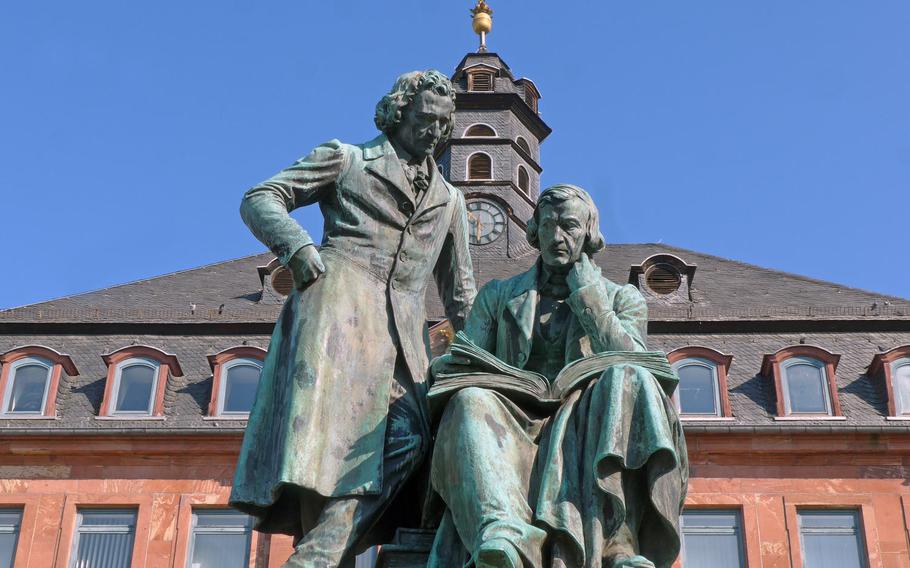
The Brothers Grimm National Monument featuring the fairy tale collectors Jacob and Wilhelm Grimm stands on Hanau's Market Square, in front of the New City Hall. (Michael Abrams/Stars and Stripes)
Hanau is a smallish German city that has long been in the shadow of the bigger, shinier Frankfurt, just downstream on the Main River.
It was, for decades, home to thousands of American servicemembers and their families. It was once a refuge for religious immigrants who found the city more welcoming than Frankfurt. It had a thriving Jewish community that was extinguished by the Nazis before and during World War II. And like many German cities, it was destroyed during that conflict.
What Hanau is best known for, however, is as the birthplace of Jacob and Wilhelm Grimm. The famous fairy tale collectors didn’t live here for long, but they left their mark on the city.
On the central market square in front of the New City Hall stands the Brothers Grimm National Monument, which features the pair. The Hanau Maerchenpfad, or Fairy Tale Path, is a series of sculptures dotting the old town that depict characters from the Grimm brothers’ collections such as “Sleeping Beauty,” “Puss in Boots” and “Little Red Riding Hood.”
Walking through town, you’ll pass other things of interest that have nothing to do with the Grimm brothers. One is a bust of Count Philipp Ludwig II of Hanau-Muenzenberg in front of the Walloon-Dutch Church. It was built by Calvinist immigrants from South Holland during the count’s reign. They traded at the Frankfurt fair but were not welcome there because of their religion. Destroyed in World War II, the Dutch church was rebuilt and is now home to the Independent Evangelical Reformed Church community. The ruins of the Walloon church stand as a reminder to the horrors of war.
North of the Marktplatz are two of the city’s newest projects, the year-old Forum Hanau, a mixture of commerce and culture, and the remodeled Freiheitzplatz, with its statue of 19th-century Jewish painter Moritz Daniel Oppenheim. The Forum features a shopping mall, the city library and archives, and space for cultural events. If you follow nearby Nordstrasse, formerly Judengasse, you will come to part of the wall that once surrounded the Jewish ghetto.
Hanau’s old town features its most beautiful building, the Renaissance Goldschmiedehaus. It was once the old city hall. Destroyed in World War II, it was rebuilt and reopened as an exhibition hall. Today it is also the headquarters of the Society for Goldsmith Art.
Next door is the Marienkirche, erected in the 13th century, also destroyed and rebuilt in the 20th.
Nearby is the Johanneskirche, with its distinct steel steeple, likewise a postwar reconstruction. Remnants of the old city wall can be seen near here.
Following the U.S. Army’s departure from Hanau in 2008, traces of American Hanau still remain. Much of Fliegerhorst Kaserne is being turned into a logistics center. Old Argonner Kaserne housing area is being redeveloped, as has New Argonner, across the road. Hanau High School is now a German school, but Pioneer Kaserne, just down the road, still stands empty.
Hanau, Germany
DIRECTIONS
Hanau is east of Frankfurt, off the A3. It is about a 40-minute drive from Wiesbaden and about 90 minutes from Kaiserslautern.
TIMES
A nice sunny day is best. If you want to visit the city’s museums, skip Mondays, as they are closed.
COSTS
There is no free parking in the city center. Be prepared to pay about 1.60 euro per hour ($1.80) at most places.
FOOD
There are plenty of restaurants in all price categories in the city squares and streets, including American fast food and kebab stands.
INFORMATION
Go to hanau.de for information. The site is mostly in German, but in the tourist information section you can download a PDF on the city’s museums in English.
Check out these other travel destinations in the Hanau area:
tinyurl.com/h944qa5 and tinyurl.com/z2pfg5q.